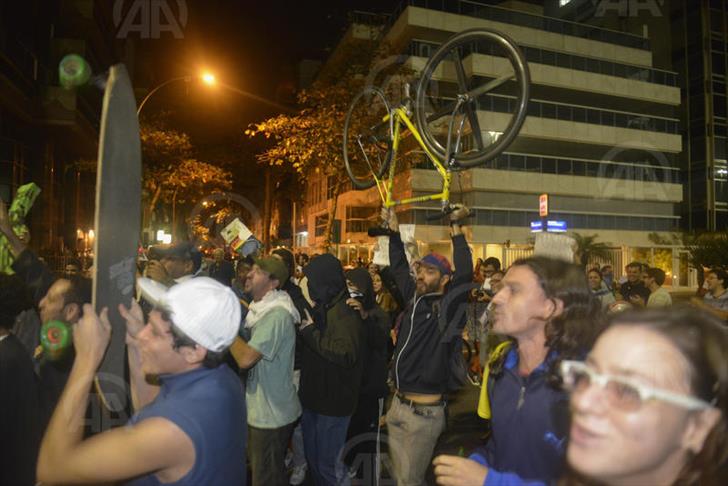Brazil ‘half-price’ Youth Statute enacted
After nearly a decade of debate, new legislation guarantees half-price concessions for students and the worst-off young people, although interstate transport is exempt

SÃO PAULO (AA) – Brazilian President Dilma Rousseff sanctioned on Monday the much-debated Youth Statute of rights concerning the country’s 15-to-29-year-olds, which guarantees half-price concessions for students and poor young people to cultural and sporting events throughout Brazil.
The bill also guarantees basic rights for young people, such as access to education, training, work and an income.
To qualify as sufficiently poor, the young person in question must register and prove that his or her family earns no more than twice the local minimum wage.
Concessionary prices will be limited to a maximum of 40 percent of places – a point that was fiercely disputed until the end. Some politicians had warned the president not to budge on the figure, but others, including youth groups, had petitioned Rousseff to veto the clause and not limit the number of concessionary places available.
Even as the president signed the bill into law, a group of young protesters outside the Presidential Palace in Brasília unravelled a banner urging: “Dilma, veto the 40% limit on half-price entry!” and booed when it became clear the bill would be sanctioned with the limit in force.
It is understood, however, that the president did veto two clauses, including one that would have extended the new law to interstate travel for students, but importantly, the bill ensures half-price local transport for all students up to 29 years of age, regardless of the reason for travelling.
However, a provision was upheld that four seats on interstate bus services must be reserved for low-paid young people – two for free, two half-price.
- A decade of debate
The bill, which had been debated in Congress for over nine years and was finally passed on July 9, sets out a number of principles and directives concerning youth-related policy at federal, state and municipal levels.
One of the biggest sticking-points had been whether tickets for major sporting events, such as the 2014 World Cup and the Olympics in 2016, should be included in the bill. However, it was considered to go beyond the scope of the new law, and will now be regulated independently by Brazil’s specially-enacted ‘World Cup Law’.
From now on, bodies and organizations will be obliged to include young people in their decision-making processes, and state and municipal youth councils will be formed, says state-run Agência Brasil news agency.
The president also signed a decree creating the Inter-ministerial Committee on Youth Politics, giving young people a voice in the country’s political system for the first time.
A new system will also be created to provide information to young people on action groups and programs, as well as careers and training advice.
- Real change after the protests
There are an estimated 51 million Brazilians between the ages of 15 and 29 that could be directly affected by the new legislation.
After some much time spent on debating the law, many have claimed that the bill has been prioritized and fast-tracked following the wave of mass anti-government protests that swept Brazil in June.
The president praised the country’s call-to-action, saying that Brazil today was a strong country where it was “possible to voice your opinions” to gain improvements to the standard of life.
“I believe it is always time for the popular, democratic participation of the Brazilian people […] More democracy demands democracy, more inclusion demands more inclusion; improvements to our lives requires us to improve our lives. That’s why it’s always time [to protest],” Rousseff told those present at the ceremony.
During the signing ceremony, Rousseff also said she was particularly worried by the level of violence directed at young and black people.
Vic Barros, the president of UNE, Brazil’s National Student Union, said the Youth Statute “deepened democracy to integrate young people into central roles in the society we want.”
Originally sparked by an increase in bus and metro fares in São Paulo, the nationwide anti-government protests saw over a million people in hundreds of cities in every state take to the streets to demand better public services and an end to political corruption and police brutality.
- Really half-price?
Reacting to the news, Fernanda Cologne, 25, a salesperson living in São Paulo, said she was delighted with the news: “The cost of living is increasing, and I love going to theatre and the cinema; it’ll make a big difference to me,” she told Anadolu Agency.
But others, particularly economists, have been more sceptical: students – and many Brazilians with fake student IDs – get so many discounts that economists say companies have tweaked prices and that the notion of “half-price” does not really exist anymore.
Certainly this was the conclusion that economists at the University of São Paulo (USP) came to a study released in June by the FEA economics faculty:
“Those who believe they are paying half-price in reality are paying almost full-price. Those paying full-price are really paying almost double,” researcher Professor Carlos Martinelli said.
Full-price tickets have increased significantly in recent years, and tickets to top shows in São Paulo today can easily cost 280 reais (around 120 USD).
With the national minimum wage in Brazil at just 678 reais (294 USD) a month in 2013, even at supposed “half-price”, tickets to many events are still out of reach for many Brazilians.








